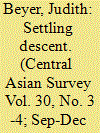|
|
|
Sort Order |
|
|
|
Items / Page
|
|
|
|
|
|
|
| Srl | Item |
| 1 |
ID:
126034


|
|
|
|
|
| Publication |
2013.
|
| Summary/Abstract |
In May 2005, after a tumultuous parliamentary election campaign had led to factionalism among the village population, village elders in northern Kyrgyzstan formed the cooperative Yiman Nuru (Light of Faith). The institution, which is headed by the local imam, was set up with the explicit aim to restore harmony and unity among all villagers. This article deals with how people in rural Kyrgyzstan try to achieve a state of well-being for themselves. Specifically, it analyses a chart the elders created upon forming the cooperative, in which they order their social and economic practices, their moral duties and responsibilities vis-à-vis other villagers, as well as their relationship with state actors, along the lines of three moral concepts: harmony, unity, and moral conduct. This chart provides a unique opportunity to probe into people's reflexivity and their own ways of reasoning about the meaning of well-being.
|
|
|
|
|
|
|
|
|
|
|
|
|
|
|
|
| 2 |
ID:
168828


|
|
|
|
|
| Summary/Abstract |
Over the last two centuries, ‘tradition’1 has been invoked in Central Asia by Russian and Soviet regimes, as well as by local Central Asian elites, largely in two ways: either as a deficiency to be overcome (often in juxtaposition to an aspirational ‘modernity’) or as a quality to be embraced (often in alignment with nationalism). The two are not mutually exclusive or even strictly separate, but the distinction serves well to outline general themes and dynamics in the work of tradition. It is likewise difficult to make clear distinctions between academic analyses and everyday invocations of the term, as they play off one another, and entirely new genres of writing and practice are still emerging. The centrality of tradition in today’s Central Asia cannot, however, be denied.
|
|
|
|
|
|
|
|
|
|
|
|
|
|
|
|
| 3 |
ID:
107544


|
|
|
|
|
| Publication |
2011.
|
| Summary/Abstract |
This article explores how the inhabitants of two villages in northern Kyrgyzstan relate to one another and to their environment in terms of both place and genealogy. By performing relatedness, people make claims upon a physical landscape, while their relationships are simultaneously shaped by perceptions of the particular place they live in. The term 'settling descent' evokes this dialectic, in which people 'settle' descent in a literal sense in rituals, statues, objects and the stories they tell about the past and the present. The often-repeated academic opposition of 'identity through kinship' vs. 'identity through locality' is resolved by showing how both are aspects of the same historical process. The paper draws on oral histories of key informants, ethnographic case studies and classical as well as recent literature on kinship, place, post-socialism and the anthropology of Central Asia.
|
|
|
|
|
|
|
|
|
|
|
|
|
|
|
|
| 4 |
ID:
168829


|
|
|
|
|
| Summary/Abstract |
Tradition has come to play an important role throughout Central Asia in a number of new ways since independence, but has been predominantly investigated regarding nation building. In this article, we show how tradition is being used operationally in the context of activism and political conflict. We expose the various motivations and tactics pursued by aksakals (lit., whitebeards) and by a movement of mature women called OBON (lit., Women Units for Special Purposes) as they participate in politics, and the role tradition plays in these activities. We argue that aksakals actively draw on tradition even in the political realm to avoid being derogatorily labelled ‘elders on duty’, whereas OBON women position themselves as economic and political actors but are subjected to discourses and practices of tradition by others. While both aksakals and OBON women have been central to political action in Kyrgyzstan in the last two decades, this article is the first to compare and contrast these two categories of unusual activists. The comparison reveals a perpetuation of culturally recognized gender roles even when these actors go beyond their ‘traditional’ realms of competence.
|
|
|
|
|
|
|
|
|
|
|
|
|
|
|
|
|
|
|
|
|